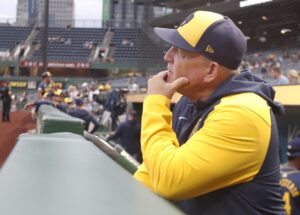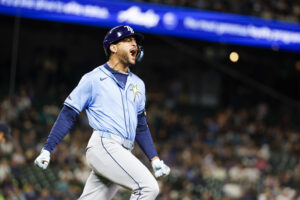The 1960s was a time of revolutionary thinking. For better or worse, people the world over were changing their views. In 1963, a man named Martin Luther King, Jr. gave a legendary speech that sparked massive racial change. In the latter part of the decade came a radical movement for peace in Vietnam. The revolution was not lost on the game of baseball, either. Expansionism had begun in earnest. Teams began swapping cities faster than a Nolan Ryan heater. There was also the formation of the Players Association. In short, the movement became extremely rapid for both teams and players.
The Braves took part in this expansionist philosophy. In 1966, they would move from Milwaukee to Atlanta. Along with the Houston Colt .45s, they became one of the first Southern teams. Dixie’s flair was evident from the beginning. It only took them three seasons to reach the playoffs and the NLCS. Unfortunately, everything around those seasons was middling. The era was marked by a decline in offense around the league. The Braves were no exception. In fact, almost everything they did in this decade was simply…average.
Braves by Decade: 1960s Milwaukee/Atlanta Braves
The Beginning of Blandness
In an unexpected move, Fred Haney resigned as manager before 1960. He’d gone a combined 273-191 in three seasons and brought them a world title. According to newspapers from that period, Haney simply wanted to spend more time with his family. Chuck Dressen was brought in to manage, and the team finished second at 88-66 that year. The offense was still humming along. Joe Adcock, Hank Aaron, and Eddie Mathews all hit 25 or more homers. Mathews and Aaron posted OPS+’s of 166 and 156, respectively. All in all, the team finished second in average (.265) and first in homers (170) and slugging (.417). The pitching did slip just a little (3.76 ERA, 91 ERA+), but Warren Spahn posted another 20 win season.
Midway through 1961, Dressen was fired. Again, it was somewhat unexpected and shocking. The team was 71-58 and seven games out of first place with 25 games remaining. A comeback, while something of a long shot, was still plausible. Dressen was replaced by Birdie Tebbetts, who’d managed the Cincinnati Redlegs in the 1950s. As for the team proper, the collective batting average fell to .258. However, the team did hit 188 homers to lead the league. Once again, Aaron, Mathews, and Adcock led the way, with 30 or more homers apiece. But the pitching paled in comparison to earlier years. Spahn was great once again (21-13, 3.02 ERA, 122 ERA+), and Don McMahon closed games well (2.84 ERA, 130 ERA+). But the rest of the staff fell somewhere between mediocre and downright awful. The team wound up 83-71.
The Braves Average Years
This began a string of blandness for the Braves. In 1962, they finished fifth at 86-76. This was followed by Tebbetts’s departure. Bobby Bragan was introduced as manager in 1963. The team went 84-78, but the real story was Spahn. He had his best season in a decade. His 23 wins tied a career-high, and his 2.60 ERA was his best since 1957. His ERA+ was 124, and his WHIP was 1.117. Aaron and Mathews combined for 67 of the team’s 139 homers. Unfortunately, it wasn’t enough to balance out the mediocrity of the rest of the team.
1964 was the same old story. Attendance plummeted as the team fought a curse of dryness. Another fifth place finish was their destiny with an 88-74 record. Once again, Mathews and Aaron led the offense, though their power numbers were down. But rookie sensation Rico Carty picked up the slack (.330/.388/.554, 22 HR, 88 RBI, 150 H, 161 OPS+). Catcher Joe Torre added some thunder of his own (20 HR, 193 H, 140 OPS+). However, things fell sharply for the 43-year-old Spahn. His age caught up with him (6-13, 5.29 ERA, 67 ERA+). The rest of the pitching was just as bad. A staff ERA of 4.19 put them ninth in the league. However, the season did bear witness to the debut of Phil Niekro.
The Big Move
Another fifth-place finish the next year was the last straw. The Braves also posted their lowest attendance since 1952. So, General Manager John McHale and the team packed up and moved to Atlanta. In 1966, the power returned, though the record remained somewhat similar. After a 52-59 start, Bragan was ousted. Billy Hitchcock took over, going 33-18 through the final 51 games. Aaron swatted 44 homers to lead the team. First baseman Felipe Alou added 31, while Torre slammed 36. In short, the team hit 207 homers, tops in the league. Unfortunately, the pitching could not help buoy such thunder. A 3.68 ERA was sixth in the league.
1967 brought more of the same for Atlanta. Towards the end of the season, Hitchcock departed. The revolving managerial door brought Ken Silvestri, who lost the final three games. The team’s batting average plummeted to .240. However, they still crushed 158 homers to lead the league. Aaron swatted 39, and third baseman Clete Boyer hit 26. Torre backed them up with 20 of his own. Unfortunately, the low hit total (1,307) could not be counteracted with the pitching. Once again, the Braves were middling in that regard. However, Niekro dazzled in the closer’s role, posting a 1.87 ERA and a 179 ERA+. But it wasn’t enough to keep the team out of the realm of the average. A 77-85 record put them seventh in the standings.
A Spark at The End
In 1968, Lum Harris was brought in to manage. The team experienced more blandness, with an 81-81 record. But the next season was one that helped the team endear itself to Atlanta. For the first time since 1958, the Braves made the playoffs. A 93-69 record helped them become the first champions in NL West history. Three Hall of Famers helped lead the team. Aaron posted yet another consistently terrific season (.300 avg, 44 HR, 97 RBI, .607 slugging, 177 OPS+). Orlando Cepeda hit 22 homers. Carty shone as well (.342 avg, 16 HR, 104 H, 164 OPS+). Niekro went 23-13 with a 2.56 ERA. Closer Cecil Upshaw posted 27 saves. Unfortunately, they could not overcome the New York Mets. They were swept in the very first NLCS. Unfortunately, this was only the beginning of a very long stretch of disappointment. The Braves would not return to the playoffs until 1982.
Main Photo:
Embed from Getty Images






